{title}
{publish}
{head}
Heritage is not only a spiritual asset but also a material resource closely tied to the livelihoods of local communities. Fully aware of its significance and mission, Phu Tho province has in recent years placed special emphasis on the investment, research, restoration, and preservation of cultural heritage (CH) values. The administrative merger of provinces has created a significant opportunity for regional linkage and the integrated promotion of shared strengths, allowing cultural heritage to transcend local boundaries and become a driving force for sustainable socio-economic development.

The Hung Kings Temple Festival, held annually, attracts a large number of participants. Photo: Phuong Thanh
As of July 2025, Phu Tho province has recorded 2,778 historical and cultural relics, of which 979 have been officially classified (6 special national relics, 176 national relics, and 797 provincial relics). The province is also home to 6 national treasures, along with thousands of artifacts and antiques preserved in the Hung Kings Museum, private museums, and historical and cultural sites across the province. Combined with the abundant heritage of Hoa Binh – the cradle of the renowned Hoa Binh culture of Southeast Asia – and Vinh Phuc, a land rich in unique architectural and artistic relics, the shared cultural legacy of the region becomes increasingly vast and compelling.
In terms of intangible cultural heritage, Phu Tho boasts nearly 2,000 items, with 5 outstanding heritages inscribed by UNESCO. Among them, two are recognized with Phu Tho as the main representative: the Worship of the Hung Kings and Xoan Singing. The remaining three – Tugging rituals and games, Ca Tru singing, and the Practices of the Mother Goddess belief – list Phu Tho as a region of cultural transmission in multinational dossiers. In addition, the province has 41 intangible cultural heritages recognized at the national level.
Archaeological heritage in the merged region is also remarkably rich, spanning from Son Vi – Hoa Binh – Phung Nguyen – Dong Dau – Go Mun – to Dong Son, forming a continuous cultural mosaic that affirms the area as the birthplace of the Van Lang State – the first nation of the Vietnamese people.
Beyond historical and cultural values, heritage in Phu Tho is deeply embedded in contemporary life. Festivals such as the Hung Kings Temple Festival, Lang Suong Temple Festival, Mother Au Co Temple Festival, Muong Bi New Year Festival, Tay Thien Festival, and Tro Tram Festival, alongside hundreds of other traditional celebrations, have become distinctive spiritual and cultural rendezvous points attracting millions of visitors. Traditional craft villages such as Huong Canh pottery, Sai Nga conical hats, Muong brocade weaving, Ly Nhan blacksmithing, and Bich Chu carpentry contribute to shaping the cultural identity of the northern midland and mountainous region.

Phu Tho’s Xoan Singing is inscribed by UNESCO. Photo: Phuong Thanh
In recent years, local authorities have focused on conserving and promoting cultural heritage in accordance with the Law on Cultural Heritage and related legal documents. The cultural heritages in the province have been identified, inventoried, and publicly announced, serving as a basis for developing and implementing plans for investment in conservation and promotion of their values. The preparation of relic site planning has been given due attention and put into practice (Planning of the Hung Kings Temple Special National Relic; Planning of the Trai Hamlet Cave and Lang Vanh Rock Shelter Special National Relic; Planning of the Tho Tang Communal House and Binh Son Tower Special National Relic; Planning of the Tay Thien – Tam Dao Special National Relic). The preparation of scientific dossiers to propose relic classification at different levels and scientific dossiers to propose inclusion in the list of national intangible cultural heritage has been carried out regularly. The work of managing, preserving, and promoting the value of heritage has been associated with patriotic education, national pride, and tourism development. Many relic sites, rituals, and traditional festivals have increasingly attracted visitors, thereby fostering the growth of the tourism sector and contributing to local socio-economic development.
The Department of Culture, Sports and Tourism (DCST) has advised on mechanisms, policies, resolutions, projects, and plans for the preservation and promotion of cultural heritage values in the province, such as: the Provincial People’s Council resolution on mechanisms to support investment in the restoration of classified relics, allowances for relic custodians, and support for artisans awarded honorary titles by the State President in the field of intangible cultural heritage; the plan to provide support for preventing the degradation of relics; the project to preserve and promote Xoan Singing; the project to preserve and promote the cultural values of the Muong ethnic group and the “Hoa Binh Culture.”
During the 2021–2025 period, nearly 250 relics were restored, renovated, and protected against deterioration; more than 40 intangible cultural heritages were preserved and revitalized. The total investment mobilized amounted to VND 1,100 billion, including VND 756 billion from the State budget and VND 344 billion from socialized sources.

The art of Muong gong performance, recognized as a national intangible cultural heritage, contributes to the dissemination of ethnic cultural values. Photo: Huong Lan
The DCST has also proposed to the Provincial Party Committee, the People’s Council, and the People’s Committee several issues, including: regulations on funding levels to support those directly guarding and protecting state-recognized historical and cultural relics in the province; mechanisms for support and investment in the restoration, renovation, and protection of state-listed historical and cultural relics; the preparation of a scientific dossier on the Tay Thien Mother Goddess Worship for submission to UNESCO for inscription as an Intangible Cultural Heritage of Humanity; and proposals on management models for certain special national relics to be directly managed by local authorities.
Huong Lan
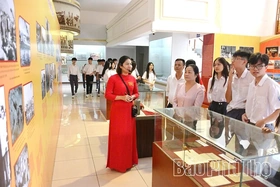
baophutho.vn Located in the center of Viet Tri city, the Hung Kings Museum has become a special cultural destination, where historical memories are...
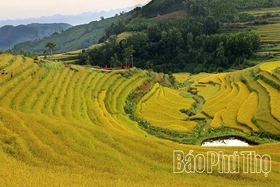
baophutho.vn The People’s Committee of Thuong Coc Commune, Phu Tho Commune convened a meeting of the Organizing Committee for the 2025 Mien Doi Terraced...
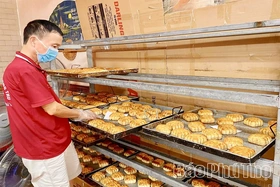
baophutho.vn During the Mid-Autumn Festival, every family considers baked and sticky mooncakes an indispensable treat. Today, mooncakes have evolved with...
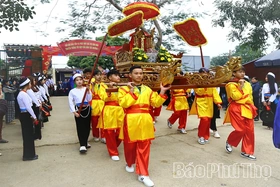
baophutho.vn The Khai Ha Festival has deeply permeated the spiritual life of the Muong ethnic group in Hoa Binh. The festival has been preserved by the...

From natural ingredients gathered in the mountains, through skillful hands and age-old secrets passed down through generations, the Muong ethnic group of Hoa Binh has created a...

A special national art programme entitled “80-year journey of independence – freedom – happiness” was held on the evening of September 1 at My Dinh National Stadium in Ha Noi...
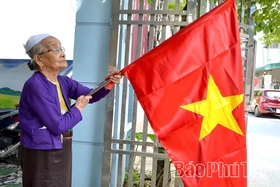
baophutho.vn Every year, on the occasion of National Day, September 2, the Muong people of Thinh Lang, Hoa Binh ward, as well as many other Muong areas in...

baophutho.vn Tro Temple in Tu Xa commune, Lam Thao district (now Phung Nguyen commune) is not only a historical and cultural relic but also a place where...

baophutho.vn Amid the sweltering summer heat, the fire in the forges of Ban Mach village, Vinh Phu commune, still burns brightly.

baophutho.vn Phu Tho, known as the ancestral land of Vietnam, is not only the cradle of the Worship of Hung Kings—an intangible cultural heritage of...